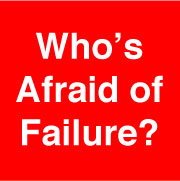“It is impossible to live without failing at something, unless you live so cautiously that you might as well not have lived at all-in which case, you fail by default.” — JK Rowling, in a speech to Harvard graduates
 A whole lot of years ago, when I was a junior in college studying sociology, I took a course that was cheerfully titled Organizational Disasters. Taught by business school icon Charles Perrow, the class zipped briskly through the surprisingly complex, counterintuitive character of catastrophe. (Example: when ships collide at sea, it’s rarely a matter of random happenstance. Usually, such crashes involve a perversely synchronized choreography, in which each captain predicts the other’s moves exactly wrong.) The chief lesson I remember from the course: we’d be a lot better off if we paid more attention to failure. But we don’t … mostly because it’s such an exquisitely uncomfortable subject. Seen Failure Magazine lately? Probably not. Why hasn’t Failure been a big success? In part, because it’s pretty hard to find people and organizations willing to serve as the cover story. (If Failure fails, will people study that failure? Where will the results be published? But I digress.)
A whole lot of years ago, when I was a junior in college studying sociology, I took a course that was cheerfully titled Organizational Disasters. Taught by business school icon Charles Perrow, the class zipped briskly through the surprisingly complex, counterintuitive character of catastrophe. (Example: when ships collide at sea, it’s rarely a matter of random happenstance. Usually, such crashes involve a perversely synchronized choreography, in which each captain predicts the other’s moves exactly wrong.) The chief lesson I remember from the course: we’d be a lot better off if we paid more attention to failure. But we don’t … mostly because it’s such an exquisitely uncomfortable subject. Seen Failure Magazine lately? Probably not. Why hasn’t Failure been a big success? In part, because it’s pretty hard to find people and organizations willing to serve as the cover story. (If Failure fails, will people study that failure? Where will the results be published? But I digress.)
Well, we’re going to be talking plenty about failure at this year’s NewSchools Summit, and particularly in a session called Learning from Success and Failure. In Silicon Valley, the home of this year’s Summit, the innovation-driven culture understands failure, as few other places do, as an essential and even vital part of the process of coming up with better ideas. It’s just as important—maybe even more important—to study failure as to examine success. Alongside a mantra of “fail early, often, and cheap,” it’s a cultural axiom that you won’t have good new ideas without trying a few that don’t work. Reed Hastings notes that he led a half-dozen failed ventures before he came up with Netflix.
Yet education entrepreneurs don’t talk a lot about failure, or at least not publicly. For a fledgling movement with well-organized opponents, that’s not entirely surprising. Moreover, schools and kids aren’t hard-disk components or social-networking site widgets—risk has to be treated very differently when a child’s education is involved. But education entrepreneurship has reached a stage where we need to talk, within and outside our movement, with greater frequency and clarity about the lessons of both success and failure.
In Learning from Success and Failure a truly estimable group of innovators from across sectors—entrepreneurship, philanthropy, school districts, and government—will come together to talk about how to make these conversations easier and more frequent. The session is moderated by Dan Katzir, a senior adviser at The Broad Foundation, whose experience includes stints as an education entrepreneur and as executive director of the UCLA School Management Program. Confirmed speakers include Jim Shelton, a longtime entrepreneur and former NewSchools partner who now serves as Assistant Deputy Secretary for Innovation and Improvement at the Department of Education; Tom Vander Ark, a former school system chief and head of education for the Bill & Melinda Gates Foundation, who is now a partner in a private equity fund focused on education innovation; and Darryl Cobb, a partner at Charter School Growth Fund who has held leadership roles at KIPP and founded the ACT charter organization. They’ll share some notable successes and failures, and help us think about how to learn lessons from both.